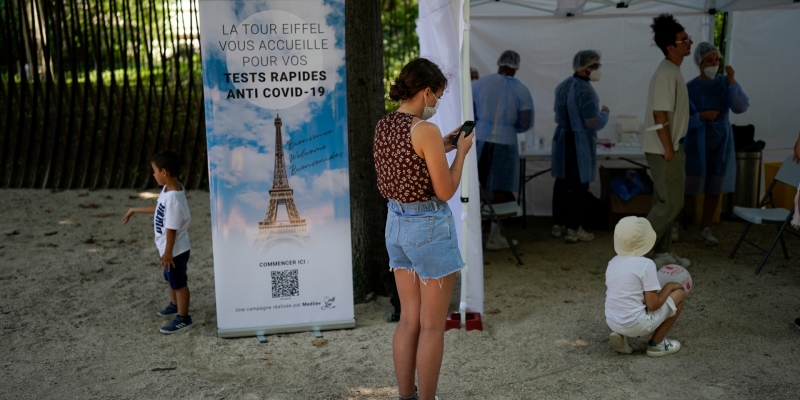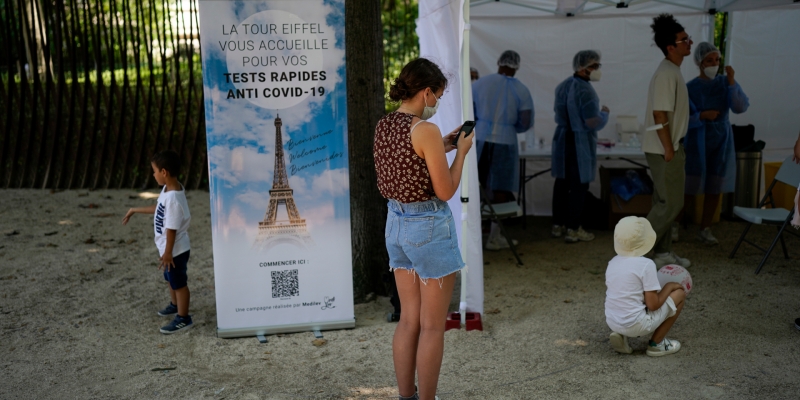InFollowing France, similar documents can be introduced in Germany and Italy In France, a law has been approved introducing restrictions for those not vaccinated against COVID-19. Such a measure is being discussed in Germany, and in Italy, doctors were obliged to get vaccinated. According to opinion polls, Europeans support restrictions for the unvaccinated

What anti-weed restrictions are legally introduced in France
On the night of Sunday to Monday, July 26, the French National Assembly approved in the third reading a bill on additional measures to combat COVID-19. The law extends the validity of “health passes” – paper or electronic certificates containing information about the vaccination of their owner, as well as about the presence of antibodiesor a negative test for coronavirus. Those who have been vaccinated with Pfizer, Moderna, AstraZeneca and Johnson & Johnson vaccines approved by the European regulator (EMA), as well as those who have recently been ill or received a negative PCR test result, can receive the document. The Government also plans to separately determine which foreign vaccination certificates will be taken into account.
The pass will become mandatory in France from the beginning of August, it will be checked at the entrance to the premises of cafes, restaurants and when boarding public transport-train, bus and plane. Since July 21, the system of applying sanitary passes has already started working when passing to concerts, festivals, sports and other events in which people take partmore than 50 people participated. The new law approved by the Parliament also introduces mandatory vaccination for health care workers, as well as for the guardians of patients. The law specifies that specialists who refuse vaccination will not be dismissed, but will be temporarily suspended from work with the deprivation of wages.
The discussion of the bill took the French parliamentarians 60 hours. “We have two options: to introduce health passes in the very near future, or to be exposed to the threat of [the spread of COVID-19], which may lead to the need to re-introduce a lockdown in the country,” Health Minister Olivier Veran said shortly before the voting day. As a result, the bill was supported by 195 members of the upper house of the Senate (129 against), and 156 deputies of the National Assembly (60 against). Now the bill approved by both chambers is sent for consideration to the Constitutional Council.
Chairman of the National Assembly, member of the party ” Forward, Republic!”Richard Ferrand praised the deputies for a responsible decision. “We have an awareness of the serious danger that our country is in, we are facing an outbreak of COVID for the fourth time,” said the senator of the center-right party “Republicans” Philippe Ba.
At first, passes will be checked only for adults, but from September 30, teenagers from 12 years old will also be subject to verification. It is planned that the new rules will be in effect until November 15, but the deadlines may be shifted depending on the epidemiological situation. The extension of this regime is possible only with the approval of the Parliament.
Earlier, the French parliament discussed a stricter version of the bill: it was supposed, in particular, to use passes for access to the summer verandas of cafes and restaurants. It was also planned that the document would be required to attend events where the conditions theoretically allow accepting more than 50 people. The final version does not contain these restrictions.
As of July 25, 16,167 people have fallen ill in France over the past day, six have died. For the entire time of the epidemic, 5.99 million cases were identified, 111644 people died. The share of French people who received at least one dose of the vaccine is 57.8%, according to the statistical portal Our World in Data. The France24 TV channel reports that, according to the Doctolib website, through which the French sign up for vaccination, since the announcement in July of new restrictions for the unvaccinated, more than 2 million citizens have applied for vaccination.
Where else in the European Union are they discussing mandatory vaccination
France has become the first major European country to introduce large-scale restrictions on the unvaccinated. The rule of mandatory vaccination of medical workers is still in force in Italy, but the list of measures to tighten restrictions for the unvaccinated, including access to public places, is still under discussion.
In Germany, there are also discussions about the introduction of restrictions for the unvaccinated. The possibility of such a measure was announced by the head of the Office of the Federal Chancellor of Germany, Minister for Special Assignments Helge Braun. It can be implemented in case of an increase in the number of infected COVID-19. Unvaccinated people may be banned from visiting restaurants, cinemas and stadiums. But the head of the ruling Christian Democratic Union party and the candidate for the post of Chancellor of Germany from the CDU/CSU union, Armin Laschet, opposed the introduction of restrictions.
In the United Kingdom, it was recently decided to lift all restrictions in most regions. British Prime Minister Boris Johnson believes that summer is the most profitable season for lifting restrictions, because in autumn and winter people are more likely to contact indoors. “We are opening up, and this is the right decision. If we don’t do it now, we will open the doors in the fall or winter, when the virus has advantages in the form of cold weather, ” Johnson said.
How much do Europeans support restrictions
French President Emmanuel Macron announced his intention to tighten measures to combat COVID-19 on July 12, and five days later 114 thousand people took part in mass actions against mandatory vaccination. The protesters accused Macron of abuse of power and a coup d’etat. Among the organizers of the protests were the “yellow vests”, who became famous for the mass riots in 2018. On July 25, 161 thousand French people took to the streets across the country, the number of protesters in Paris was 11 thousand. Macron on thishe said that every Frenchman has the right to disagree with the opinions of others, including the government. “However, there is no such freedom when I am in no way bound by duties towards others,” he continued, recalling that the refusal to vaccinate one person may endanger many others, including his relatives. “I don’t want to call it [refusal of vaccination and protests] a choice in favor of freedom. I call it irresponsibility and selfishness, ” Macron summed up.
The majority of French people support the decision of the authorities to introduce “health passes” and mandatory vaccination. According to a survey by the Elabe Research Center published on July 13, 76% of respondents supported the decision on mandatory vaccination of health workers. The share of supporters of the measure on checking “health passports” when boarding transport also amounted to 76%. Demonstrations against these measures, as follows from the survey of the Ifop organization, are supported by 35% of citizens, 49% treat them negatively, the rest are indifferent.
A study by the Italian company Swg, the results of which were presented on July 21, showed that six out of ten respondents in the country agree with the need to introduce “health passports” in transport and public places located indoors. 49% of Italians have a positive attitude to the use of such documents, 21%they support their introduction when the number of diseases increases, but 19% are completely against the introduction of a throughput system. A study published on July 15 by the Italian service Euromedia Research shows that 68.4% of respondents have a positive attitude to the mandatory use of a pass when visiting restaurants, hotels, cinemas, trains and planes, against 25.5%.
In the UK, 61% of respondents are positive about the idea of “health passports”, according to an April survey by YouGov, 29% are against it, the rest are undecided. In Germany, health passports are also supported by more than half of citizens-60%, a YouGov poll published in February showed.
Similar indicators were revealed by an April study by Ipsos, commissioned by the World Economic Forum (21 thousand people in 28 countries were interviewed). According to this study, 68% of respondents agreed that such certificates should be checked before attending major events, and 55% support the introduction of such checks in restaurants and bars.
RBC on YouTube Live broadcasts, videos and recordings of broadcasts on our YouTube channel

